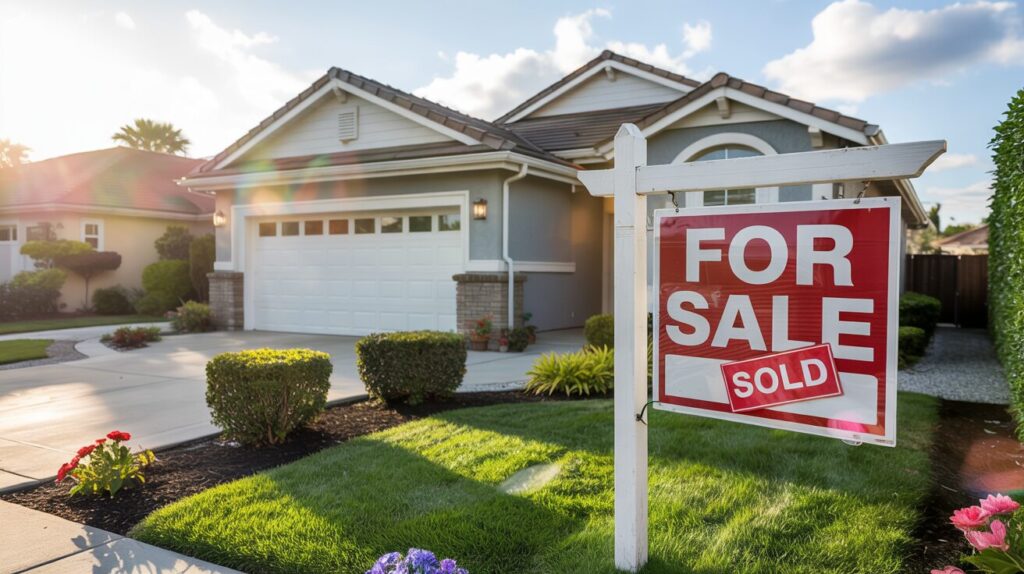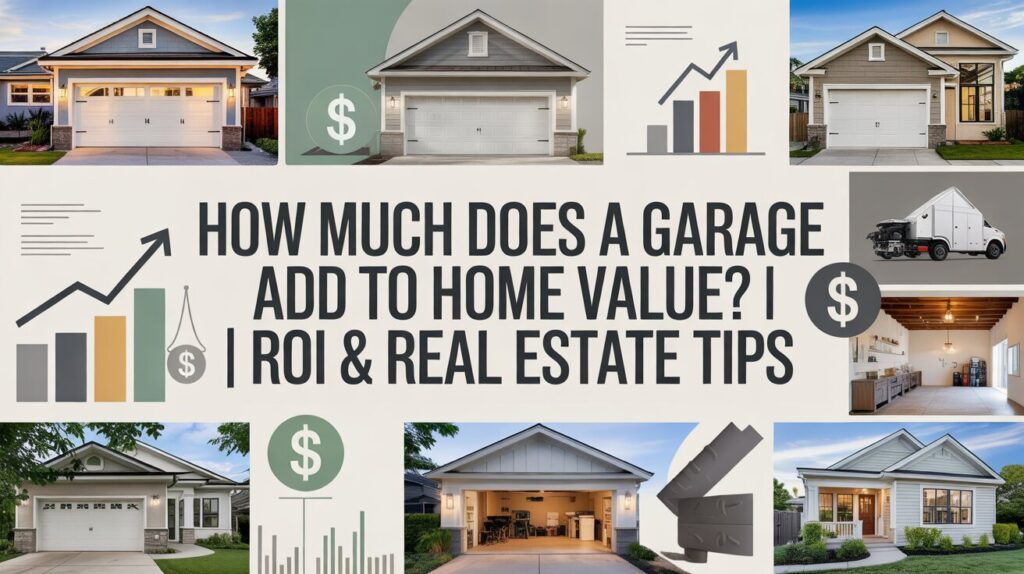Wondering if adding a garage is worth the investment? You’re not alone. Whether you’re planning to sell soon or just curious about improving your property value, this question matters.
In this article, I’ll break down exactly how much value a garage adds to your home in today’s market.
You’ll discover:
- The average ROI percentages for different garage types
- Which features buyers value most
- Regional differences that affect your return
As a realtor with years of experience, I’ve seen firsthand how garages impact sale prices. I’ve helped hundreds of homeowners make smart decisions about property improvements.
By the end of this guide, you’ll know whether building a garage makes financial sense for your specific situation. No hype, just practical advice you can use to make an informed decision about your biggest investment.
Why Garages Matter in Real Estate

Garages aren’t just for cars anymore. They’ve become a must-have feature for many homebuyers today.
I’ve shown hundreds of homes over my career, and I notice how buyers’ eyes light up when we walk into a clean, spacious garage. It’s often a deciding factor.
Why does this happen?
For starters, garages offer practical benefits that nearly everyone values:
- Protection for vehicles from weather and theft
- Extra storage space for seasonal items
- Potential workshop or hobby area
- Direct home access during bad weather
But the appeal goes deeper than that.
A garage represents possibilities. You might see a place to store your Christmas decorations. Your partner might envision a home gym. Your teenager might dream of band practice space.
Think about your own home search. Didn’t you pay special attention to properties with garages?
The numbers back this up. In most markets, homes with garages sell faster and for more money than similar homes without them.
Let me show you exactly how this translates to dollars and cents in today’s market.
How Much Value a Garage Can Add (By the Numbers)
Let’s cut to the chase with some real figures. I’ve analyzed recent market data to show you exactly what garages are worth in today’s market.
On average, a garage adds 5-10% to your home’s value. For a $350,000 home, that’s $17,500-$35,000 in added value!
But the numbers vary widely based on several factors:
- Single-car garage: Typically adds 3-5% to home value
- Two-car garage: Adds 6-10% to home value
- Three-car garage: Can add 8-12%, especially in luxury markets
Location matters tremendously. In cold-weather states like Minnesota or Michigan, a garage might add up to 15% to your home’s value. In milder climates like Florida, the premium drops to around 3-5%.
Your neighborhood sets expectations too. If every house on your street has a two-car garage and yours doesn’t, you’ll face a significant value penalty.
The condition makes a difference as well. A new, well-constructed garage adds more value than an older, worn-down structure needing repairs.
Remember: These percentages translate to real money. On a $400,000 home, even a 5% increase means $20,000 in your pocket when you sell.
Key Factors That Influence Added Value
When it comes to garage value, context is everything. I’ve seen identical garages add dramatically different amounts to home values based on these key factors:
1. Location
The urban/suburban divide is huge here. In cities where parking is scarce, a garage can add up to 15% to your home’s value. In suburban areas with ample street parking, the premium typically drops to 5-8%. Rural properties see the smallest percentage gain, though buyers still appreciate the protection and storage.
2. Climate
Weather matters more than you might think. In Minnesota, where snow removal is a winter ritual, a garage is practically essential. Homes without garages in snowy regions can sit on the market 30-45 days longer than comparable properties with them.
The garage premium in cold-weather states can be twice what you’d see in milder climates.
3. Neighborhood Norms
This is crucial but often overlooked. If every home on your block has a two-car garage and yours doesn’t, appraisers will deduct value. Conversely, building a three-car garage in a neighborhood of one-car garages might not yield the return you’d expect.
4. Garage Features
Not all garages are created equal. These upgrades can boost your ROI:
- Proper insulation (especially in extreme climates)
- Finished walls and floors
- Built-in storage systems
- Automatic doors with smart technology
- Adequate lighting and electrical outlets
Cost vs. Value Analysis
Building a garage isn’t cheap, and you need to know if the investment makes financial sense. I’ve broken down the typical costs against the value you can expect to recoup.
1. Average Construction Costs (2025)
- Single-car garage: $20,000-$30,000
- Two-car garage: $35,000-$60,000
- Three-car garage: $60,000-$90,000
These prices include the foundation, framing, roofing, doors, basic electrical, and minimal finishing. Costs vary widely based on your location, materials chosen, and contractor rates.
2. Return on Investment
The ROI for garage additions typically falls between 65-85%. This means for every dollar you spend, you’ll get back about 65-85 cents in home value.
Let’s put that in real terms:
- $40,000 two-car garage × 75% ROI = $30,000 in added value
- Your net cost: $10,000
Is this a good investment? It depends on your situation.
If you’re selling within 1-2 years, the math might not work in your favor. But if you’ll enjoy the garage for 5+ years before selling, the personal utility plus eventual resale boost often justifies the expense.
Worth noting: Attached garages generally provide better ROI than detached ones, and conversion of an existing structure (like a carport) offers the highest return percentage.
The bottom line: A garage usually won’t pay for itself entirely at resale, but the combination of personal value and increased home value makes it worthwhile for many homeowners.
When a Garage May Not Add Much Value
Despite what you might think, garages aren’t always worth the investment. I’ve seen plenty of situations where homeowners were disappointed by the limited return on their garage addition.
Here are the scenarios where you should think twice:
1. Already Crowded Lot
- Sacrificing most of your usable yard space for a garage
- Creating a property that feels cramped or overcrowded
- Eliminating outdoor living areas that families value
- Reducing overall curb appeal due to poor proportions
2. High-End Neighborhoods
- Basic garages in luxury markets often underwhelm buyers
- Failing to match the quality level of surrounding properties
- Missing expected premium features like epoxy floors or custom storage
- Creating a “weak link” in an otherwise high-end property
3. Areas With Mild Weather Year-Round
- Regions where weather protection isn’t a major concern
- Markets where carports are common and accepted
- Communities with ample, safe street parking
- Areas where outdoor lifestyle is prioritized over garage space
4. Wrong Size for the Market
- Building a single-car garage in a two-car garage neighborhood
- Creating a space too small for modern vehicles
- Failing to match the expectations of your target buyer demographic
- Spending money but still being the “inadequate garage” house
5. Poor Construction Quality
- Using substandard materials that don’t match the home
- Cutting corners on electrical work or structural elements
- Skipping proper insulation or climate considerations
- Creating drainage issues that can damage the home or property
Remember that real estate value always comes down to what buyers in your specific market want. Before spending on a garage, talk to a local realtor who knows your neighborhood trends inside and out.
Tips for Maximizing Your Garage’s Impact on Home Value
Want to get the biggest bang for your buck with your garage project? I’ve helped countless homeowners make smart choices that boosted their home’s appeal and value.
Here’s what really works:
1. Focus on Functionality First
- Ensure doors open and close smoothly with quality operators
- Install adequate lighting throughout the space
- Add sufficient electrical outlets (at least one per wall)
- Consider plumbing for a utility sink if budget allows
- Create proper drainage to prevent water damage
2. Storage Solutions Matter
- Install sturdy wall-mounted storage systems
- Add overhead racks for seasonal items
- Consider custom cabinetry for tools and supplies
- Include hooks and hangers for bikes, garden tools, etc.
- Keep floor space clear for vehicles (this is still a garage!)
3. The Floor Makes a Difference
- Seal concrete floors to prevent staining and dust
- Consider epoxy coatings for durability and easy cleaning
- Use quality materials that can handle vehicle traffic
- Address any cracks or unevenness before selling
- Choose neutral colors that appeal to most buyers
4. Insulation and Climate Control
- Properly insulate walls and ceilings
- Weather-strip doors and windows to prevent drafts
- Consider a small heating option in cold climates
- Add ventilation for air circulation
- Maintain a dry environment to prevent mold issues
5. Curb Appeal Counts
- Match garage design to your home’s architectural style
- Choose complementary colors and materials
- Install attractive, quality garage doors
- Add tasteful exterior lighting
- Keep the approach and driveway in good repair
Remember, the goal is to create a space that potential buyers can easily imagine using and enjoying. A well-designed garage doesn’t just add value, it can often be the feature that tips a buyer’s decision in your favor.
Conclusion
Adding a garage to your home is more than just a construction project, it’s a strategic investment that can significantly boost your property’s appeal and value.
While the ROI varies based on location, climate, and neighborhood standards, most homeowners see returns between 65-85% of their investment. The key is making smart choices that align with your market’s expectations and needs.
Focus on quality construction, practical features, and maintaining proportion with your property’s overall size and style. Remember that even when the financial return isn’t complete, the added convenience, security, and storage a garage provides delivers substantial personal value during your ownership.
If you’re planning to sell soon or simply wanting to enhance your living situation, a well-designed garage represents one of the most reliable home improvements you can make in today’s real estate market.
Frequently Asked Questions
Is a detached or attached garage better for resale value?
Attached garages typically offer better ROI, adding 6-8% to home value compared to 4-6% for detached structures. Buyers generally prefer the convenience of direct home access, especially in harsh climates.
How does garage size affect home appraisals?
Most appraisers assign specific values based on garage capacity. Single-car garages typically add $5,000-$15,000, while two-car garages add $20,000-$35,000 to appraisals, depending on local market conditions.
Should I convert my garage into living space?
This is usually a poor financial decision. While the living space might be valuable, eliminating a garage typically reduces home value by 5-10% and significantly limits your buyer pool when selling.
Do electric vehicle charging stations in garages increase home value?
Yes! Homes with EV charging capabilities now command a premium of 3-5% in many markets. This upgrade typically costs $500-$2,000 but can return $10,000+ in added value in EV-friendly regions.
Is it better to renovate my existing garage or build new?
Renovation generally offers better ROI (70-90% return) compared to new construction (65-85% return). If your garage’s foundation and basic structure are sound, updating rather than replacing is usually the smarter financial choice.

